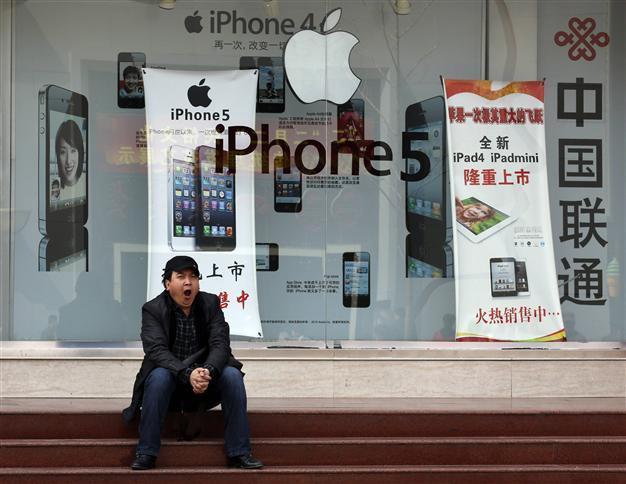Apple apologises after China outrage
BEIJING - Agence France-Presse

A man yawns in front of a mobile phone shop bearing an advertisement of Apple's iPhone in Beijing April 2, 2013. REUTERS photo
Apple chief executive Tim Cook has apologised to Chinese consumers after the US technology giant was subjected to a barrage of criticism in state-run media over alleged "arrogance" and double standards.China is Apple's second-biggest market, and its iPhones and other products -- many of them made in the country -- are highly popular, although it faces fierce competition from South Korea's Samsung.
State media, particularly the People's Daily, the Communist Party's mouthpiece, carried vehement attacks on Apple over its customer service and returns policies over several days.
But questions have been raised over the motives behind the attacks, and some users expressed support for the firm Tuesday, while a market research analyst said that Apple had been unfairly targeted.
In a Chinese-language letter to "respected Chinese consumers" issued on the company's website late Monday, Cook said Apple had "profoundly reflected on the opinions" expressed in the country.
"We realised that the lack of external communication during the process has led the outside world to think that Apple was arrogant and did not care or paid no attention to consumers' feedback," he said.
"We sincerely apologise for any concerns or misunderstanding this has caused to consumers." Cook, who took over as Apple's CEO from founder Steve Jobs in August 2011, added that the firm had "many things we have to learn" in operating and communicating in China and will revise some warranty policies.
Apple will provide new components, including new back covers, when replacing any parts of iPhone 4 and iPhone 4S models that break down, he said.
Chinese consumers have had to pay around $80 for new back covers, said Chinese media reports, which said the policy amounted to "double standards" as they were free in other markets including South Korea, Britain, and Australia.
Beijing and Washington are embroiled in a series of rows over cyberspying and technology.
The People's Daily ran critical items for five consecutive days last week, at one point urging consumers to "strike away Apple's unparalleled arrogance", after condemnations on state broadcaster CCTV.
But users of China's Twitter-like weibos were split on Tuesday, with some backing Apple and saying state-owned Chinese firms deserved more criticism for poor service.
"CCTV can just hunt down foreign (companies). Go hunting down China Unicom and China Telecom if you really have guts," said a weibo user with the online handle Miss Aquan, referring to two state-owned telecom operators.
Liwan Langshao, another Internet user, suggested Apple had been forced into the apology, saying: "You will be the next Google if you do not bow your head." Google in 2009 suffered state media potshots followed by official penalties, and later effectively shut down its Chinese search engine after months of tensions with authorities over censorship. It now sends mainland users to an uncensored site in Hong Kong.
Chinese state-run media generally welcomed the Apple statement, with the nationalist Global Times saying it showed the firm's "professionalism and flexibility".
"The blame should not only lie in foreign companies, but also China's business environment," it said in an editorial.
China's foreign ministry also weighed in, with spokesman Hong Lei saying: "It is completely normal for the Apple company to apologise to Chinese customers. I think this act is commendable." But Ben Cavender, an associate principal of China Market Research Group in Shanghai, said Apple had been unfairly targeted by state media and research by his consultancy found customers thought the firm gave good service.
"This is an element of a very high-profile international brand being targeted when in reality maybe their target is not justified," he told AFP.
But Apple could take no chances in China, he added, as few large economies will continue to have strong growth in future and it was the biggest of them.
"It's definitely a must-win market because this is where they are going to get a lot of fast growth going forward," he said.
An Apple spokeswoman declined to comment further on the letter.
















